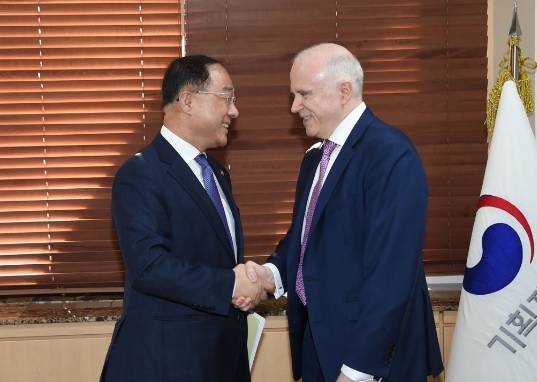South Korea will create momentum for an economic rebound next year, the country's chief economic policymaker said Thursday.
Asia's fourth-largest economy suffered a setback as exports slowed amid a global economic slowdown and the trade dispute between the United States and China.
About 40 percent of South Korean exports go to the US and China -- South Korea's top two trading partners and the world's two largest economies.
 |
(Yonhap) |
The International Monetary Fund has recently lowered its growth forecast for South Korea's economy this year to 2 percent from its previous outlook of 2.6 percent.
"Next year, our economy could be at a crossroads as to whether it can recover its growth path," Finance Minister Hong Nam-ki said in a meeting with executives of biomed startups.
Earlier in the day, Hong met with a three-member delegation from Fitch Ratings Inc. led by James McCormack, head of sovereign ratings, and said South Korea will mobilize all policy tools to achieve a 2 percent range of economic growth this year.
Hong said South Korea's economic growth could improve next year, citing recent growth forecasts by the IMF and the Organization for Economic Cooperation and Development.
The IMF and the OECD have projected that the South Korean economy could grow 2.2 percent and 2.3 percent, respectively, in 2020.
Hong also said he expects Seoul and Tokyo to hold working-level talks soon to discuss Japan's export restrictions targeting th Korea.
South Korea and Japan are trying to decide on the date and the venue of working-level talks, which would then lead to the resumption of long-stalled talks between the director-generals of the two countries' trade ministries.
Last week, South Korea and Japan agreed to hold the talks, and Seoul conditionally suspended the expiry of their military information-sharing pact.
In July, Tokyo imposed tighter regulations on exports to South Korea of three materials critical for the production of semiconductors and flexible displays, citing Seoul's lax control system of strategic items that can be diverted for military use.
Japan also removed South Korea from its list of trusted trading partners.
South Korea views the Japanese moves as retaliation against last year's South Korean Supreme Court rulings ordering Japanese firms to compensate South Korean victims of forced labor during Japan's 1910-45 colonial rule of the Korean Peninsula.
Hong said South Korea will continue its efforts to stabilize the supply of key industrial materials and parts and to strengthen overall industrial competitiveness even if Japanese exports curbs are lifted. (Yonhap)








